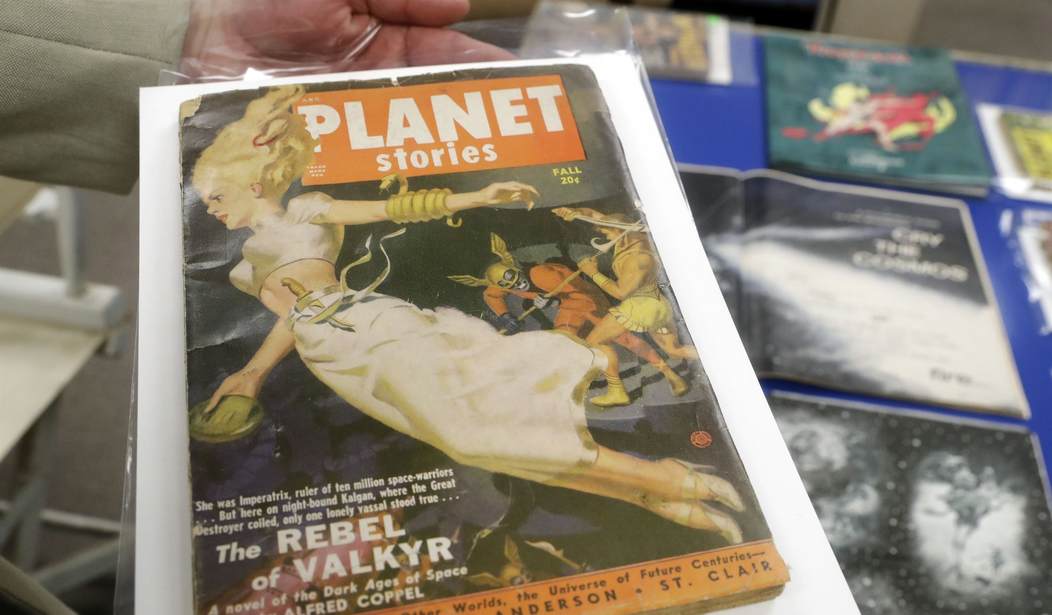I was brought up reading science fiction. Credit for that goes to the Old Man, who "advised" me to read not only the classics but also a wide range of fiction and non-fiction.
Maybe my father was a bit unusual for an Iowa farmer who grew up during the Depression, but he was an avid reader of the classics as well as modern fiction and science fiction. I still have a collection of his old pulp mags, like "Amazing Stories" and "Astounding Science Fiction," many dating back to before I was born. Reading those is as entertaining today as it was when I was a boy. I read science fiction extensively, from the founding of the genre by Edgar Rice Burroughs and H.G. Wells to the greats, like Isaac Asimov, Ray Bradbury, and Robert Heinlein. Watching television shows like "Lost in Space" and "Star Trek" later on just cemented my love of science fiction, and now I'm a science fiction writer myself.
Given that as a background, I've often wondered why television and movie adaptations of those greats are almost universally horrible.
Science fiction done as original work can be great. I have watched the wonderful series "Firefly" and its feature-length movie conclusion, "Serenity," several times and still love it. I have all of the original "Star Trek" films, and even though "Star Trek science" is practically a synonym for "bull***t" I still enjoy watching Shatner, Nimoy, Kelly, Doohan, Nichols, and Koenig work their magic. (The later adaptations? Not so much.)
Point of order: You'll notice I didn't mention "Star Wars. I don't consider "Star Wars" to be science fiction. It's a mystical fantasy that happens to take place in space.
Adaptations, though, of some of the greatest works of written science-fiction, when put on either the big or small screen, are frequently just awful. Hollywood is just too liable to, as my Brit friend would put it, make a dog's breakfast of the whole thing. Let's look at a few examples.
"A Princess of Mars/John Carter." The majority of the film's story comes from Burroughs' first Barsoom novel, which was actually titled "A Princess of Mars." The movie adaptation? Terrible. Aside from some perfectly understandable changes — for instance, in the books, Dejah Thoris, the princess in the title, famously wore nothing but jewels, which would have changed the movie's rating — the whole film was laden with clunky CGI (although I admit that the depiction of the Tharks wasn't at all bad,) awkward scripting, and poor character development.
But the movie industry only went downhill from there.
"I, Robot." Asimov's original work by this name was a short story collection largely centered around Dr. Susan Calvin and the development of robots, including the famous Three Laws of Robotics. Elsewhere in the Robot series, there was a police detective from Earth, Elijah Baley, who, in the novel "Caves of Steel," teamed with the robot R. Daneel Olivaw to solve the murder of a roboticist. The movie, on the other hand, had little to do with the book other than the title and the fact that robots were involved, and one of the characters was named Susan Calvin. Other than that, it was a mildly entertaining Will Smith film featuring Will Smith doing Will Smith stuff and rattling off Will Smith one-liners. Asimov would not have recognized the story.
But the worst was yet to come.
"Foundation." It's impossible to state my fondness and admiration for Isaac Asimov's masterpiece, seven novels published from 1942 to 1986, with tie-ins to his "Robot" and "Galactic Empire" series to form a sweeping, galaxy-spanning, millennia-spanning saga. It is broadly regarded as one of the greatest science-fiction sagas ever produced, is rumored to have been a large part of the inspiration for George Lucas' "Star Wars," and has entertained science-fiction fans for eighty years. Why, then, did Apple make such a hash of it?
Forget the nonsensical race- and sex-swapping of major characters. If they had stayed true to the story, we could have overlooked that. But there are too many illogical changes that we can't overlook; for instance, in the books, the Galactic Empire was ruled by a pretty traditional, hereditary monarchy, where each emperor had an heir who came to the throne in his order; Apple, instead, presents us with an odd sort of genetic hierarchy where the Emperor Cleon is endlessly cloned, with three ruling at any given time: a child, a man in his prime, and an elder. That just makes no sense. Also, in the second season, we see the advent of the Mule, a giant of a man, a telepath, who at one point picks up another character by the throat and throws her some distance; in the books, the Mule was a frail, weak man, a malnourished freak whose mental abilities were his only strength. It just doesn't make any sense. Again, Asimov wouldn't recognize the story.
Some years ago, I happily signed a contract with a Hollywood producer, who I won't name but who was involved in the "Lord of the Rings" film, for the movie rights to my novel "The Crider Chronicles." That contract lapsed when my original publisher went out of business. And for many years I always thought I would love to see a film adaptation of one of my favorites, Heinlein's "Stranger in a Strange Land." After seeing what Hollywood and television producers have done to many of the works I love, I'm glad my contract is no more, and I'm satisfied nobody has messed with any more of my perennial favorites; I can now continue to see them in my mind's eye as I prefer, not as some Hollywood exec thinks will play well with international audiences.
Whether I'm making my happy way through the Barsoom or Tarzan novels, the "Foundation" series, or any of my extensive sci-fi collections, I see the characters and settings in my mind's eye as I want to see them. That's the great thing about reading. That's the thing that movies and television can never replace. Not even Hollywood can screw that up. What's more, that's why I'll continue writing — not in the hopes that someone will offer me a fat movie contract, but so that my readers can enjoy my work as I'd prefer, with their minds filling in the settings and the characters. Creativity requires both the producer and the consumer to be involved in the story.
I think Hollywood forgets that.













